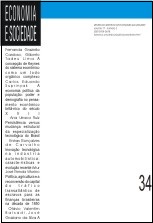Resumo
O presente artigo argumenta que elementos da abordagem da complexidade, recentemente aplicada à economia, já estavam presentes na obra de Keynes e destaca a fecundidade de uma interação entre elas. A abordagem da complexidade tem como uma idéia central a de que as ações individuais promovem conseqüências não intencionais como resultado de um processo de auto-organização, permitindo o funcionamento do sistema. Keynes explorou tal idéia, por exemplo, na elaboração do paradoxo da poupança, na análise da formação das expectativas e na incorporação do efeito multiplicador. Destaca-se que a complexidade do sistema econômico, segundo a perspectiva de Keynes, começa com a complexidade do ser humano. Por fim, sustenta-se que a visão de Keynes do sistema econômico como um organismo complexo teve a influência do filósofo G. E. Moore.
Abstract
Keynes’ Keynes’view of the economic system as a complex organic w view of the economic system as a complex organic whole This paper claims that some elements of the complexity approach, which has been recently applied to economics, were already contained in Keynes’ economics, and argues for the fecundity of an interaction between them. One of the central ideas of the complexity approach is that individual actions have unintended overall consequences as a result of a self-organization process, which allows the functioning of the system. Keynes played around with the idea of unintended consequences of individual actions, for instance, in the formulation of the paradox of parsimony, in the analysis of the expectations formation, and in the inclusion of the multiplier effect. It is argued that the complexity of the economy, from Keynes’ perspective, is firstly related to the complexity of the human being. Also, it is suggested that Keynes’ view of the economy as a complex organism was influenced by the philosopher G. E. Moore.
Key words: Keynes, John Maynard. Complexity. Self-organization
Referências
ALBIN, P. S. Barriers and bounds to rationality. D. K. Foley (Ed.). Princeton: Princeton University Press, 1998.
ANDRADE, R. P. A agenda do keynesianismo filosófico: origens e perspectivas. Revista de Economia Política, v. 20, n. 2, abr./jun. 2000.
ARTHUR, W. B. Complexity and the economy. Science, p. 107-109, Apr. 1999.
ARTHUR, W. B; DURLAUF, S.; LANE, D. Introduction. In: ________; ________; ________ (Ed.). The economy as an evolving complex system II. Reading, MA: Addison-Wesley, 1997.
CARABELLI, A. On Keynes’s method. London: Macmillan Press, 1988.
COATES, J. The claims of common sense: Moore, Wittgenstein and the social sciences. Cambridge: Cambridge University Press, 1996.
DAVIS, J. B. Keynes’s philosophical development. Cambridge: Cambridge University Press, 1994.
DEQUECH, D. Fundamental uncertainty and ambiguity. Eastern Economic Journal, v. 26, n. 1, 2000.
FOLEY, D. Unholy Trinity: labor, capital, and land in the new economy. London: Routledge, 2003.
GRIBBIN, J. Deep simplicity: bringing order to chaos and complexity. London: Random House, 2005.
HOLLAND, J. Hidden order: how adaptation builds complexity. New York: Basic Books, 1995.
HOLLAND, J. The end of science: facing the limits of knowledge in the twilight of the scientific age. New York: Broadway Books, 1997.
HOWITT, P. The microfoundations of the Keynesian multiplier process. Journal of Economic Interaction and Coordination, v. 1, n. 1, May 2006.
KEYNES, J. M. (1921). Treatise on probability. The Collected Writings of John Maynard Keynes. Ed. by D. Moggridge, v. VIII. London: Macmillan, 1972.
KEYNES, J. M (1926). Francis Ysidro Edgeworth. The Collected Writings of John Maynard Keynes. Ed. by D. Moggridge, v. X. London: Macmillan, 1972.
KEYNES, J. M. (1931). A treatise on money. The Collected Writings of John Maynard Keynes. Ed. by D. Moggridge, v. V e VI. London: Macmillan, 1972.
KEYNES, J. M. (1933). Alfred Marshall. The Collected Writings of John Maynard Keynes. Ed. by D. Moggridge, v. X. London: Macmillan, 1972.
KEYNES, J. M. (1936). A teoria geral do emprego, do juro e da moeda. São Paulo: Editora Nova Cultural, 1985. (Coleção Os Economistas).
KEYNES, J. M (1937). A teoria geral do emprego. In: SZMRECSÁNYI, Tamás (Org.). John Maynard Keynes. Editora Ática, 1984.
KEYNES, J. M. (1938). My early beliefs. The Collected Writings of John Maynard Keynes. Ed.by D. Moggridge, v. X. London: Macmillan, 1972.
KEYNES, J. M. The general theory and after: defense and development. The Collected Writings of John Maynard Keynes. Ed. by D. Moggridge, v. XIV. London: Macmillan, 1973.
KOPPL, R. Animal spirits. Journal of Economic Perspectives, v. 5, n. 3, p. 203-210, 1991.
LEWIN, R. Complexity: life at the edge of chaos. Chicago: The University of Chicago Press, 1992.
LIMA, G. T. Em busca do tempo perdido: a recuperação pós-keynesiana da economia do emprego de Keynes. Rio de Janeiro: BNDES, 1992.
MINI, P. Keynes, Bloomsbury and the general theory. Basingstoke: Macmillan, 1991.
MOORE, G. E. Principia ethica. Cambridge: Cambridge University Press, 1903.
NICOLIS, G.; PRIGOGINE, I. Exploring complexity: an introduction. New York: W. H.
Freeman & Company, 1989.
O’DONNELL R. M. Keynes: philosophy, economics & politics. London: Macmillam, 1989.
PRIGOGINE, I.; STENGERS, I. Order out of chaos: man’s new dialogue with nature. New York: Bantam Books, 1984.
PRYOR, Frederic L. Economic evolution and structure: the impact of complexity on the U.S. economic system. New York: Cambridge University Press, 1995.
ROSSER JR., J. B. On the complexities of complex economic dynamics. Journal of Economic Perspectives, v. 13, n. 4, 1999.
SHACKLE, G. L. S. Keynesian kaleidics: the evolution of a general political economy.
Chicago: Edinburgh University Press, 1974.
WALDROP. Complexity: the emerging science at the edge of order and chaos. New York: Touchstone, 1992.
A Economia e Sociedade utiliza a licença do Creative Commons (CC), preservando assim, a integridade dos artigos em ambiente de acesso aberto.

